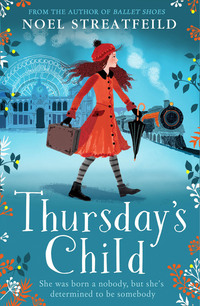
Noel Streatfeild 2-book Collection
‘Well, truthfully,’ said Margaret, ‘it’s not likely the wrong mother would want me. What for?’
The rector smiled.
‘How do we know?’ he teased her. ‘Some day you may prove to be the heir to a great fortune. Remember Thursday’s child has far to go.’
‘Or,’ Hannah suggested, ‘you might become famous. I’m always telling her, sir, she might write a book. You ought to hear the stories she tells me of an evening, and all out of her head.’
‘So you see,’ said the rector, ‘I must keep the baby clothes for the day when your mother claims you.’ He got up. ‘Now I must get on with your affairs. I will arrange for the carrier to call here on the 27th.’
Hannah still had the wicker basket which she had brought to Saltmarsh House. Now she gave it to Margaret. To make her an ‘underneath’ trousseau she had raided the old ladies’ cupboards. There she had discovered an unused length of flannel, part of a roll bought to sew Miss Selina into one winter when she had pleurisy, and there was a voluminous cambric petticoat once worn by Miss Sylvia and other useful bits and pieces. She had sewn the clothes at night after Margaret was in bed, so it was the night before she left that Margaret saw them for the first time after they were packed in the wicker basket.
‘Three of everything,’ Hannah said proudly, lifting layers of tissue paper. ‘Three plain cambric petticoats. Three pairs of drawers with feather stitching. Three scalloped flannel petticoats. Three linings in case at that orphanage they make you wear dark knickers. Three liberty bodices and three nightdresses – all fine tucked.’ Then Hannah drew back yet one more piece of tissue paper. ‘And here for Sundays is a petticoat and a pair of drawers edged with lace.’
Margaret gasped. Then she threw her arms round Hannah.
‘Lace! Oh, darling Hannah, thank you. It’s like being a princess. When we go to church on Sundays I’ll be sure to see my frock sticks on my heel so everyone can see the lace.’
Hannah was shocked.
‘You’ll do nothing of the sort. What you have to remember is you were spoke for by an archdeacon so don’t shame him.’ Then she turned back to the wicker basket. ‘Your Bible and Prayer Book are in the bottom. I’ve tucked your stockings in wherever there is room, but on the top are your hankies, your brush and comb, your toothbrush and one nightie so you can get at them easy if you arrive late. And in a corner down at the bottom is that tin of mine with the cat on it you’re fond of. I’ve filled it with toffees.’
Suddenly it all seemed terribly final. Although most of Margaret had accepted that she was going to the orphanage, another part of her had refused to believe it. Could she really be going away from the rector and Hannah and all the people she knew and loved? With a howl she threw herself at Hannah.
‘Must I go? I’ll work in the house much more than I ever have before. I’ll like dusting, truly I will, and I’ll hardly eat anything at all.’
Hannah, her eyes dimmed by tears, gave Margaret a little push.
‘Don’t, my darling. Don’t. It won’t do no good.’ Then she knelt down and closed the wicker basket and fastened round it a leather strap.
Chapter Three
THE JOURNEY
The orphanage was poor. The endowment, which a hundred years before had seemed more than sufficient to dress, feed and house a hundred orphans, was now quite inadequate. Charitable people subscribed and sometimes held bazaars and jumble sales to raise funds, but there was still barely enough to keep the home going. The matron, who was a hard woman and in any case disapproved of spoiled orphans, kept the expenses down as low as they would go, largely by saving on food. ‘What won’t fatten will fill’ was one of her favourite sayings. As a result, Miss Jones, called assistant nurse but really assistant everything, who had been sent to meet Margaret and the other children, was very conscious of the lightness of the bag in which was her own and the orphans’ dinners to be eaten in the waiting room. A stale loaf of bread, some margarine, one ounce of cheese per person and a bottle of water.
Miss Jones was already in the waiting room when Hannah and Margaret arrived. She scarcely looked at them but fixed horrified eyes on the wicker basket.
‘I hope that is not the child’s luggage. You were informed no luggage was to be brought.’
Hannah had measured up Miss Jones. ‘That’s a jumped-up Miss Nobody,’ she thought. Out loud she said:
‘No young lady I have charge of goes away without baggage and they’re not doing so now, and don’t forget Margaret is no common orphan, she was spoken for by the archdeacon whose brother is one of the orphanage governors.’
Miss Jones never saw the governors, her life was ruled by Matron, of whom she was terrified. But it was common knowledge in the orphanage that even Matron had to listen to the governors. Perhaps if this child – to whom she had taken an instant dislike – knew a governor it was better to leave the question of her baggage to Matron. She looked coldly at Margaret.
‘You are, I suppose, Margaret Thursday.’
‘That’s right,’ Margaret agreed. ‘Of course, Thursday isn’t my real name. I was called that because that was the day the rector found me and …’
Miss Jones pointed to the bench on which she was sitting.
‘That’s enough talking, sit down quietly.’ Then she said to Hannah: ‘You can go now.’
Both Margaret and Hannah forgot Miss Jones. They gazed at each other with stricken faces.
‘Oh, my dear pet!’ said Hannah, holding out her arms. ‘Oh, my dear pet!’
Margaret put down the basket and ran to her.
‘Hannah! Hannah! Don’t leave me.’
Hannah, with tears rolling down her face, knelt and hugged her.
‘You got some stamps,’ she whispered, ‘the rector gave you. Bear it if you can, dear, but if you can’t you write and something might be thought of.’
Margaret hugged Hannah tighter.
‘Don’t leave me. You can’t! You can’t!’
Hannah knew every minute she stayed made things worse for Margaret. She freed herself from her clinging arms and, blinded by tears, stumbled towards the door. Margaret tried to run after her, but Miss Jones had stood enough. She grabbed Margaret by the wrist and picked up the wicker basket.
‘Sit down and behave yourself. I never saw such a display. You wait until Matron hears of this.’
‘Hannah! Hannah!’ screamed Margaret.
But Hannah was gone and the door had shut behind her.
Miss Jones was furious. There were others in the waiting room and they were looking pityingly at Margaret. It was too much, making her look like the wicked stepmother in a fairytale when really she should be admired.
‘Be quiet,’ she said in an angry whisper. Then, raising her voice for the benefit of the others in the room: ‘This is a very ungrateful way to behave for you are a lucky girl to be going to St Luke’s.’
At that moment there was a diversion. The waiting-room door opened and three more children came in – a girl and two boys. They were shabbily dressed in black and each was as golden-haired as Margaret was brown. The eldest, who was the girl, led her brothers towards Miss Jones. In spite of the shabby clothes, she had evidently known better days for she spoke in the clear voice of the well-educated.
‘Are you the lady from St Luke’s?’
Miss Jones nodded.
‘You must be the three Beresford children.’
‘That is correct,’ the girl agreed. ‘I am Lavinia. This’ – she pulled the elder boy forward – ‘is Peter, and this’ – she tried to pull forward her younger brother – ‘is Horatio,’ but Horatio refused to be pulled.
‘Don’t like that lady,’ he announced. ‘Horry wants to go home.’
Miss Jones made tch-tching noises. This really was her unlucky day. Now another child was going to make a scene. But she had reckoned without Lavinia.
She let go of Horatio’s hand and felt in her coat pocket and brought out a sweet and put it in the little boy’s mouth.
‘You mustn’t mind him,’ she told Miss Jones. ‘He’s only little, but he’ll settle down.’
Miss Jones opened her coat to look at her watch, which was fixed to her blouse with a gunmetal bow. Thankfully she saw it was time to eat.
‘Now sit down, all of you, and have some dinner. We have a long journey ahead of us.’ She opened the dinner bag and took out the food and a knife. She cut five slices of bread, smeared on a little margarine, then on each slice she placed a small knob of very dry cheese. She passed a slice to each of the children. Horatio looked in disgust at his slice.
‘Is this meant to be dinner?’ he asked.
Lavinia put an arm round him.
‘Eat it, darling,’ she whispered. ‘Then you shall have a sweetie.’
Margaret had received her slice but she made no effort to eat. She had succeeded in stopping crying except for an occasional hiccuping sob, but she had such a lump in her throat she knew she couldn’t swallow anything.
Lavinia, taking advantage of a moment when Miss Jones was repacking the food and the knife, leant across to Peter.
‘Put the little girl’s slice in your pocket,’ she whispered. ‘She’ll be hungry later on.’
Somehow the other children had got the food down them. Miss Jones took another look at her watch. She got up.
‘Come along,’ she said. ‘Pick up that basket, Margaret, and hold my hand. You three,’ she told the Beresfords, ‘follow me and be sure to keep close.’
In the train Margaret began to feel better. Presently she felt so much better she was able to eat her bread and cheese, now rather hairy after being in Peter’s pocket. They had a reserved compartment and Miss Jones sat in a corner as far from the children as possible, so in a whisper Lavinia and Margaret exchanged information.
‘I’m not going to St Luke’s except for a few days,’ Lavinia explained. ‘There were only vacancies for the boys. Anyway I’m fourteen, so I’m going into service somewhere near so I can see the boys on my half days.’
Margaret could not imagine Lavinia in service, she was not a bit like Hannah or that poor Martha at the school.
‘Will you like being in service?’
‘I want to learn how to run a house,’ Lavinia explained.
Peter broke in.
‘Our mother said you could never give orders if you didn’t know how a house should be run.’
Margaret had not supposed orphans gave orders, so Peter’s statement cheered her. She knew that she would be a giving-orders sort of person, but it was nice to think she would not be alone. Then she had another cheering thought. Perhaps if she made friends with these children Lavinia would see her as well as her brothers on her half days.
‘I’m ten, nearly eleven,’ Peter told her. ‘How old are you?’
‘I’m nearly eleven too,’ said Margaret. ‘How old is he?’ She pointed to Horatio.
‘It’s rude to point,’ said Horatio, ‘but if you want to know I’m six.’
Peter was determined Margaret should be well informed.
‘Our mother’s dead,’ he announced.
‘Yes, I suppose she is, and your father too,’ Margaret agreed, ‘or you wouldn’t be orphans.’
Peter started to answer that, but Lavinia evidently didn’t want him to.
‘No, we wouldn’t be, would we? Now tell us about you.’
‘Well,’ said Margaret, ‘I’m not properly an orphan. I was found on a Thursday in a basket on the church steps with three of everything of the very best quality.’
The Beresfords were thrilled.
‘How romantic!’ said Lavinia.
Peter looked admiringly at Margaret.
‘So you could be absolutely anybody?’
‘That’s right,’ Margaret agreed.
‘And until this Christmas every year gold money was left in the church in a bag to keep me.’
‘And nobody saw who left it?’ Lavinia asked.
‘Never.
‘My goodness,’ said Peter, ‘it’s like a book!’
Lavinia looked across at Miss Jones and saw she was asleep.
‘Peter is going to write books when he grows up,’ she whispered to Margaret. ‘He’s very clever, he never stops reading.’
‘I keep hoping there’ll be books in the orphanage,’ said Peter, ‘then I won’t mind how awful it is.’
Horatio looked as though he might cry.
‘It won’t be awful, Vinia, will it?’
Lavinia sighed.
‘Why did you say that?’ she said to Peter. ‘Now he’s going to cry and I’ve no sweets left.’
That was Margaret’s moment. She climbed quietly on to the seat and took her wicker basket off the rack.
‘But I have,’ she said. ‘A whole box of toffees. Let’s share them out before she wakes, for I bet they won’t let us eat them when we get there.’
Chapter Four
THE ORPHANAGE
The train did not arrive at Wolverhampton until nearly six o’clock and then there was a long drive in a horse-drawn omnibus. As a result the children, who since breakfast had only eaten the slice of bread and the morsel of cheese, were so exhausted that they scarcely took in the orphanage.
To make everything more muddling the orphans appeared to be wearing fancy dress. They were having supper when the children first saw them. Forty-nine girls at one table, forty-eight boys at another, eating, the children noticed sadly, only bread and margarine and drinking what looked like cocoa.
‘Oh dear!’ Lavinia whispered to Margaret. ‘I did hope it would be soup and perhaps eggs.’
The ‘fancy dress’ was, the children were to learn, ordinary orphanage wear. It had been designed when the orphanage had first opened over a hundred years before and had never been changed. For the girls there were brown cloth dresses to the ankles, white caps and long aprons. For the boys there were loose brown trousers and short matching coats. Out of doors both girls and boys had brown capes. On Sundays the girls had white muslin scarves folded into their dresses and the boys wore white collars.
That first night the children seemed to see nothing but brown everywhere they looked – brown out of which rose the noticeably pale faces of the orphans. As the children stood in the doorway swaying with tiredness and hunger, they were startled by the harsh voice of the matron.
‘Don’t stand there gaping, sit down. There is room for you two boys there and you girls here.’
Lavinia pulled herself together.
‘I think perhaps,’ she suggested in her quiet but authoritative voice, ‘I had better sit beside my little brother just for tonight. He is so tired he may need some help …’
She got no further for she was confronted by Matron, a stout woman who looked as if she had been poured into her black dress and then had set inside it, so upholstered did she look. She had sandy reddish hair and a fierce red face.
‘I am matron here, young woman,’ she said, ‘and I give the orders. Off you go, boys, and you two girls sit. And do not forget to thank God for your good food.’
The bread was stale and hard to get down, but the children were ravenous, and the cocoa – if it was cocoa, for it tasted of nothing – was hot.
‘We can have two slices each,’ a little girl next to Margaret whispered to her, ‘and sometimes, if there’s any over, a drop more cocoa.’
Lavinia strained round to see how Horatio was getting on. Fortunately he was not crying for he was nearly asleep, but he was swallowing the pieces of bread soaked in cocoa which Peter was pushing into his mouth. Then she saw that Miss Jones, who was talking to Matron, was pointing to Margaret.
‘Expect a storm,’ she whispered to Margaret. ‘I’ve a feeling Miss Jones is telling Matron about your basket.’
Miss Jones was, and presently Matron came striding over to Margaret, her black, upholstered chest heaving with what appeared to be rage. She clapped her hands.
‘Silence, everybody,’ she roared. ‘What, children, is the orphanage rule about luggage?’
‘Bring no luggage,’ the children chanted, ‘everything needed will be provided.’
‘And is it provided?’ Matron asked.
‘Yes,’ answered the children.
‘But here we have a new orphan who has quite deliberately disregarded the committee’s rule.’ Matron beckoned to Miss Jones. ‘Bring Margaret Thursday’s basket.’
Miss Jones – a much meeker Miss Jones than the one who had met the children – scuttled out and was soon back carrying, as if it were a bomb, Hannah’s wicker basket. At the sight of it in Miss Jones’s arms, Margaret nearly broke out crying. Was it only last night that Hannah had so proudly shown her what she had packed? Lavinia slipped a hand into Margaret’s.
‘Don’t give that Matron the pleasure of seeing that you mind. I bet she likes seeing people cry.’
Clearly Matron was surprised, in fact, almost pleased, at the beautifully made and packed clothes. She had placed the basket on the end of the girls’ table and had tossed aside the tissue paper. But as she took out one garment after another she made no comment except an occasional mutter to Miss Jones. ‘Ridiculous.’ ‘Much too good for an orphan,’ and finally, ‘Lace! Look, Jones, lace!’ But as she repacked the little basket she laid a few things on one side.
‘Come here, Margaret,’ she said.
Giving Margaret’s hand a last squeeze, Lavinia moved to let Margaret get off the bench. Margaret, having scrambled over the bench, raised her chin in the air and marched over to Matron.
‘I have not yet decided what shall be done with these clothes, but you may keep your Bible and Prayer Book and your toothbrush. What is this tin for?’
Matron held out the now empty toffee tin. The much-loved cat’s head seemed almost to smile at Margaret. She swallowed a sob.
‘It’s to keep things in. It was a goodbye present.’
Perhaps because she had no use for it, for it could not have been from kindness, Matron laid the tin beside the Bible, Prayer Book and toothbrush.
‘You can go back to your seat. Take these things with you. Now stand, children. Grace.’
The orphans pushed back the benches and stood, hands folded, heads bent. Then they sang Bishop Ken’s Doxology.
Praise God, from whom all blessings flow.
Praise Him, all creatures here below,
Praise Him above, ye heavenly host,
Praise Father, Son, and Holy Ghost.
‘Yes, indeed,’ said Matron. ‘Never forget how fortunate you are and how much you have for which to praise God. See them up to the dormitories, Jones, but leave Lavinia Beresford with me.’
‘Oh, couldn’t I see Horatio to bed?’ Lavinia pleaded. ‘He’s so little and so tired.’
Lavinia, from the tone of Matron’s voice, might have suggested having a bath in public.
‘Go into the boys’ dormitory! Are you mad, girl? Quick, children, march.’
The boys went first, each one as he passed Matron bowing his head as if before a shrine. At the end, dragged along by Peter, came Horatio. He was, Lavinia saw, really walking in his sleep so he at least would not suffer. The girls followed the boys, but they, as they passed Matron, each had to curtsey.
‘I won’t curtsey to anybody,’ Margaret muttered to Lavinia.
‘Don’t be a fool,’ Lavinia retorted. ‘What is the point of putting her back up?’
Margaret respected Lavinia’s opinion and anyway she was too tired and too miserable to have much fight in her. So, clutching her possessions, she followed the last girl and, in spite of having her arms full, succeeded in making the necessary bob.
‘I don’t like the look of that girl,’ Matron observed to Miss Jones, who was following the children. ‘She has a proud air, she must be humbled.’
‘Quite so, Matron,’ Miss Jones agreed. ‘I thought the same the moment I saw her, and the scene she made in the waiting room was disgraceful.’
Lavinia followed Matron into her sitting room. It was, she noticed, a surprisingly comfortable room to find in that desolate place, and though it was March there was a cheerful fire burning in the grate. Drawn up to the fire was a table laid for a meal. Evidently, thought Lavinia, she is going to have her supper. Matron sat down at her table, but she did not ask Lavinia to sit.
‘I have good news for you,’ she said. ‘The Countess of Corkberry, who has always taken a kindly interest in this place, needs a scullery maid. You are to receive five pounds a year, but Her Ladyship has agreed to advance part of that sum so that you may have a respectable wardrobe. I understand you have a tin trunk at the railway station. Does it contain any clothes suitable for a scullery maid?’
‘I don’t really know what a scullery maid wears,’ Lavinia confessed, ‘but I have some plain frocks, perhaps they will do.’
‘Nonsense!’ said Matron. ‘You will need print dresses, aprons and caps and a black outfit for Sundays. All the staff have to attend church.’ She looked at Lavinia’s fair plaits. ‘And of course you must put your hair up.’
‘My hair up!’ Lavinia gasped. ‘I’m only just fourteen.’
‘Fortunately in sewing classes our girls work at wardrobes for our leavers who are going into service, so you can be fitted out – at your expense, of course. I should think two days will be enough to provide everything. A carrier will bring your box here tomorrow.’
‘Two days!’ said Lavinia. ‘I had hoped perhaps a week to see the boys settled in.’
‘Two days,’ said Matron. ‘We have no room for you here. For tonight a mattress has been put on the floor at the end of the girls’ dormitory …’ Matron stopped for there was a knock on the door. ‘Come in.’
The knock had been made by a girl who looked no older than Margaret. She was wearing the orphanage uniform but her hair was screwed up inside her cap. She was carrying a laden tray.
‘Ah, Winifred! Supper,’ said Matron. ‘Good.’
Winifred put in front of Matron a large steak, a dish of potatoes and another of cauliflower. Then from a cupboard she fetched a bottle of porter.
Lavinia felt saliva collecting in her mouth at the sight of such good food.
‘That will be all, Lavinia,’ said Matron. ‘Winifred will direct you to the girls’ dormitory.’
Margaret, shivering with tiredness and lack of food, had accepted without question the bed pointed out to her. She had followed the other girls into an inadequate washroom in which were jugs of cold water and tin basins, in one of which they all cleaned their teeth. She had been shown a tiny shelf over her bed on which she was told to put her toothbrush and mug, her Bible and Prayer Book.
‘And when Miss Jones says “Pray” you stop whatever you are doing and kneel by your bed,’ her guide whispered, ‘or she hits you with a hairbrush.’
Margaret had just pulled on the ugly coarse greyish-coloured nightdress, which was lying on her bed, when the order came for prayer. She hurriedly dropped to her knees and buried her face in her hands. Evidently it was Miss Jones who decided how long prayers should be, for a few moments later there was another bark from her. ‘Up, girls, and into your beds.’
Margaret had hidden the tin Hannah had given her in her bed. In the dark she hugged it to her. It was a little bit of Hannah. Putting her head under the scratchy inadequate bedclothes, she stifled her sobs.
‘I can’t bear it. They’ve taken all my clothes. I’ll never wear lace on Sundays. Oh, Hannah! Hannah!’
But when a little later Lavinia crept up to the dormitory and found Margaret, though her face was wet with tears, she was asleep.
Chapter Five
FIRST DAY
When Margaret woke up the next morning she could not at first think where she could be. Accustomed to a room of her own, she was puzzled by the sleeping sounds which came from the orphans. Then, as if a cold heavy weight had dropped on to her solar plexus, she remembered. This was the orphanage. St Luke’s Orphanage that the archdeacon had told the rector was ‘an exceptionally pleasant place’. Pleasant! Rage filled Margaret. Then she remembered she had three carefully hidden stamps – wait until she wrote to the rector and told him what the archdeacon had dared to describe as exceptionally pleasant.





